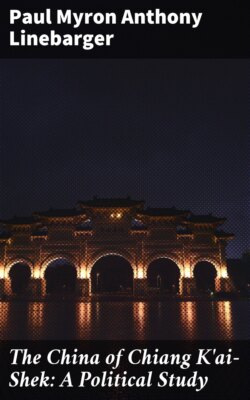Читать книгу The China of Chiang K'ai-Shek: A Political Study - Paul Myron Anthony Linebarger - Страница 18
На сайте Литреса книга снята с продажи.
The President of the National Government
ОглавлениеTable of Contents
The term National Government (Kuo-min Chêng-fu) is employed in two senses. In the broad sense, it refers to the entire central government of China. In the narrow sense, it is a synonym for National Government Committee (Kuo-min Chêng-fu Wei-yüan-hui), commonly translated as Council of State. The highest governmental officer of China is the Kuo-min Chêng-fu Chu-hsi—literally, the Chairman of the National Government. Since this officer is the formal head of the National Government in both senses of the term, his office may with equal appropriateness be described as Chairmanship of the Council of State and as Presidency of the National Government. The latter has been most commonly accepted, although it obscured the clarity of the Chinese governmental pattern. It is essential to note, however, that in the National Government period there has been no President of the Chinese Republic; the highest officer has been the President of the National Government of the Chinese Republic, and as such the titular head of the Chinese state for international purposes. This officer possesses prestige rather than power, and is roughly analogous to the President of the Third French Republic.
In his official capacity, the President acts as chairman of the meetings of the Council of State, performs the ceremonial functions entailed by his office, and serves as the custodian of the symbols of continuity and legitimacy. Wang Shih-chieh writes: " … the Chairman more or less occupies a nominal position. At most, he can give occasional advice, only within certain limits, to the Executive or other Yüan, with no power at all to decide or to reject the policies adopted by the Yüan. As a matter of fact, from the end of the Year XXI (1932) down to the present, since the man filling the office of Chairman [President] of the National Government is very calm and law-abiding, he has never interfered in the activities or policies of the various Yüan."[11] This officer has been the veteran Kuomintang leader, Lin Shên, long a resident of the United States, a key man in overseas affairs of the Party, and a person of much dignity, charm, poise and prestige. With a long beard and a humane, scholarly demeanor, President Lin has fulfilled most admirably the requirements of his office.
Generalissimo Chiang regularly reports on government activities to Lin Chu-hsi, addressing him attentively and respectfully. This is no perfunctory sham, but appears to be a very real search for advice and guidance. The two men are close associates and have been such for many years; the Generalissimo gives every indication of regarding his venerable colleague with affectionate esteem. During the Chungking bombings, the President has commonly resided in a secure place outside the city. He is not needed for the daily prosecution of the war, but both the office and its incumbent are strongly stabilizing factors in the National Government. (The Japanophile Wang Ch'ing-wei, establishing his duplicate regime in Nanking, left the Presidency open for many months, pirating Lin Shên's name. Finally Wang gave himself the title, although he patently would have preferred Lin.)
